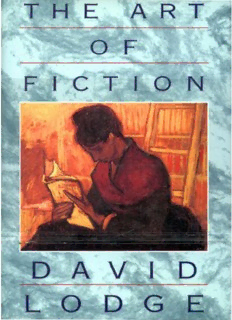
Lodge, The Art Of Fiction PDF
Preview Lodge, The Art Of Fiction
T HE A RT O F wi F I C T I ON D A V ID L O D GE $22.00 T he articles with which David Lodge entertained and delighted readers of the Independent and The Washington Post Book World for fifty weeks between 1991 and 1992 have now been revised, expanded, and collected together in book form. The art of fiction is considered under a wide range of headings, such as the Intrusive Author, Suspense, the Epistolary Novel, Time-shift, the Sense of Place, and Symbolism. Each topic is illustrated by a short passage or two taken from classic and modem fiction, ranging from Laurence Sterne to J.D. Salinger, from Jane Austen to Fay Weldon, from Charles Dickens to Martin Amis. David Lodge takes these passages apart and puts them back together again with the expertise of a novelist, critic, and teacher. Technical terms are lucidly explained, and their applications examined, in the literary-critical equivalent of slow-motion replays of some of the best writing in the English language. To throw further light on a given topic the author sometimes refers directly, and revealingly, to his own experience of writing fiction. This book is essential reading for students of literature, aspiring writers, and anyone who enjoys literary fiction and would like to understand better how it works. 0793 DAVID LODGE has published nine novels, including Paradise News, Nice Work (short-listed for the Booker Prize and winner of the Sunday Express Book of the Year Award, 1988), Small World (also shortlisted for the Booker Prize in 1984), How Far Can You Go? (Whitbread Book of the Year, 1980), and Changing Places (awarded the Yorkshire Post and Hawthomden prizes). He is Honorary Professor of Mod ern English Literature at the University of Birmingham, where he taught from 1960 to 1987, and is the author of several other works of literary criticism. He lives with his wife and children in Birmingham. Jacket design by Melissa Jacoby Jacket painting by Vincent Van Gogh, The Nouel Reader, 1888. Private collection. Photograph courtesy of The Lefevre Gallery, London. VIKING PENGUIN a division of Penguin Books USA Inc. VIKING 375 Hudson Street, New York, N.Y. 10014 Printed in U.S.A. C EI II F hen does a novel begin? The question is almost as difficult to answer • w as the question, when does the human embryo become a person? Certainly the creation of a novel rarely begins with the penning or typing of its first words. Most writers do some preliminary work, if it is only in their heads. . . . For the reader, however, the novel always begins with that open ing sentence (which may not, of course, be the first sentence the novelist originally wrote). And then the next sentence, and then the sentence after that. . . . When does the beginning of a novel end, is another difficult ques tion to answer. Is it the first paragraph, the first few pages, or the first chapter? However one defines it, the beginning of a novel is a threshold, separating the real world we inhabit from the world the novelist has imagined." —from The Art of Fiction ISBN 0-670-84848-4 The Art of Fiction Also by David Lodge NOVELS The Picturegoers Ginger, You're Barmy The British Museum is Falling Down Out of the Shelter Changing Places How Far Can You Go? Small World Nice Work Paradise News CRITICISM Language of Fiction The Novelist at the Crossroads The Modes of Modern Writing Working With Structuralism After Bakhtin ESSAYS Write On PLAY The Writing Game THE ART OF FICTION Illustrated from Classic and Modern Texts DAVID LODGE VIKING VIKING Published by the Penguin Group Penguin Books USA Inc., 375 Hudson Street, New York, New York 10014, U.S.A. Penguin Books Ltd, 27 Wrights Lane, London W8 5TZ, England Penguin Books Australia Ltd, Ringwood, Victoria, Australia Penguin Books Canada Ltd, 10 Alcorn Avenue, Toronto, Ontario, Canada M4V 3B2 Penguin Books (N.Z.) Ltd, 182-190 Wairau Road, Auckland 10, New Zealand Penguin Books Ltd, Registered Offices: Harmondsworth, Middlesex, England First American Edition Published in 1993 by Viking Penguin, a division of Penguin Books USA Inc. 3 5 79 10 8 64 Copyright © David Lodge, 1992 All rights reserved The essays in this book first appeared in different form in The Independent on Sunday in Great Britain and in The Washington Post Book World in the United States. LIBRARY OF CONGRESS CATALOGING-IN-PUBLICATION DATA Lodge, David, 1935- The art of fiction : illustrated from classic and modern texts / David Lodge. p. cm. Includes bibliographical references and index. ISBN 0-670-84848-4 1. English fiction — History and criticism — Theory, etc. 2. American fiction — History and criticism — Theory, etc. 3. Criticism — Terminology. 4. Fiction — Technique. I. Title. PR826.L63 1993 823.009-dc20 92-50751 Printed in the United States of America Set in Ehrhardt Without limiting the rights under copyright reserved above, no part of this publication may be reproduced, stored in or introduced into a retrieval system, or transmitted, in any form or by any means (electronic, mechanical, photocopying, recording or otherwise), without the prior written permission of both the copyright owner and the above publisher of this book. To John Blackwell "genius among editors" (The Writing Game, Act Two Scene Two)
Description: